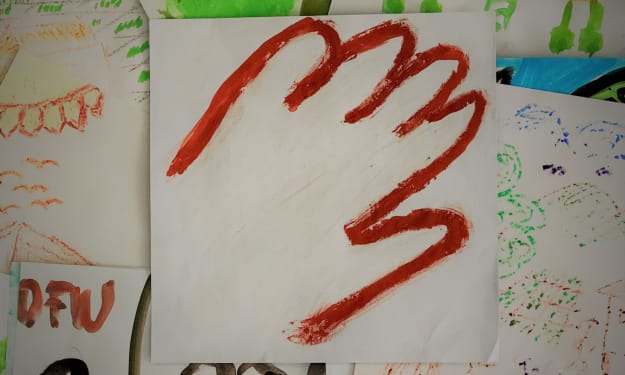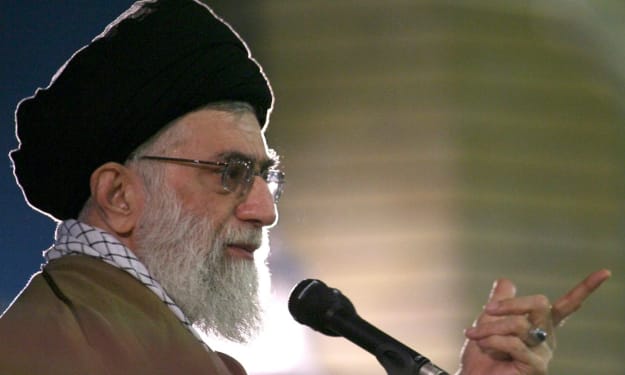
“You have freestyle?” Those three intimidating words step out from the pursed lips on an expressionless face, hidden behind dark shades that reflected the other’s face, frozen with anticipation, looking up at the tall, thin figure. Suspense climbs like a roller-coaster to the top of its tracks. The gears shifting, with a slight creak of unoiled desperation and scrambling, are almost audible from the contestant’s working mind. Draws in a deep breath. They open their mouth. And it comes out. Words flow with the rhythm of spontaneity—a stream of spoken word, poetry, lyricism. Rap.
This was the audition process I saw on my television screen when I watched the pilot episode of The Rap of China two summers ago. Originally known as 中国有嘻哈, translated as China has Hip-Hop, after a year, the reality show's name was changed to 中国新说唱 or China's New Rap. It is a rap competition reality show produced by iQiyi, an online video platform based in Beijing. Since it first aired in 2017, the show has been credited for raising the profile and popularity of hip-hop in mainland China. I had stopped watching after Season One, and the show has definitely changed in some ways since then. As a disclaimer, the following piece details my initial reaction, thoughts and reflections after watching that first season.
Honestly, I was a little sceptical, a little surprised, but most of all intrigued. I had never really been exposed to the Chinese hip-hop scene or rap music unless you count the mainstream tunes of Jay Chou and artists alike on the radio Top 40 or cheesy television ads. Not to demean Jay Chou or anything. As far as I knew, the musical genre was fairly niche in mainland China, which tended to side towards other styles like pop and rock. The fact that this show was bringing the music of oppression and empowerment, of the rich legacy of Black culture to the mainstream stage in front of the Chinese masses (who admittedly oftentimes have prejudices towards certain cultures considered 'foreign' to them) was indeed surprising.
My scepticism stemmed from how Chinese television has marketed most of its incoming content, commercialising it often to an overtly untactful extent. In another singing competition I watched previously, before revealing who was going onto the next round, the host had to announce the show’s sponsor, Ganten Water. He then proceeded to take a swig out of a bottle of Ganten on stage. I mean… had there really not been a better, subtler, more creative option?!
I was almost certain that the show would mutilate hip-hop/rap, maiming its grassroots origins and artistry into marketable fragments of superficial reality show snippets. A bit harsh? Maybe. But some of its judges were not even fully involved with the hip-hop scene in the first place, let alone qualified to coach potential artists. To signal that contestants were successful onto the next round, they were handed gold chains with the word “RICH” (stylised very tastefully as "R!CH") dangling loud and clear...Okay. I completely wanted more Chinese to be exposed to, learn about, and be accepting of hip-hop. However, I was worried this show would give a very one-sided, mediocre impression that fails to encapsulate the culture and history of struggle another group experienced, which is central to its genre.
In short, after watching the pilot, then the following episode, and then another, I was unexpectedly met with pleasant surprise. Moreover, I realised how ignorant I myself have been. There was an entire underground scene stretching over China, renowned artists branching from the icy north-east province of Heilongjiang to the fiery and bold south-west municipality of Chongqing, to the sprawling lands of Inner Mongolia. I had never known of it till I watched the show. I realised that however commercialised it was, the show inevitably had the positive impact of showcasing the underrated talent of underground rappers and hip-hop artists to the general public. The music created by these independent artists was none like I had heard before, and a far cry from the ‘hip-hop’ pruned into pop tunes that played on mainstream radio stations. It’s a fair assumption to say that most of the audience members had not known that the underground scene (obviously, given its name,) was active this entire time, myself included.
When hopefuls stepped up to audition, I had initially not taken them seriously. This was a mistaken underestimation. As soon as many opened their mouths, I was taken aback by the flow, the passion, the lyricism that poured out, laced with the elegance and finesse of Chinese characters, each one steeped with meaning and emotion, expertly woven together with wit and idioms to create the canvas that displayed each artist’s journey. Developments in the show, like the reveal of the one and only MC Jin as the mysterious contestant, made it entertaining to watch. I was excited to hear the genre I love so much being recreated and shaped by my heritage.
As much as I enjoyed and eventually got invested in the show and its upcoming artists, something uneasy still hung over my head. As you inspect each contestant and form your first impression of them, a few key aspects of their appearances stand out. Often, it’s their fashion; most of the rappers were clearly adopting the attire of hip-hop culture in the States and the UK—gold chains, rave shades, oversized T-shirts, some sporting ‘wavy garms,' the like. The look of fierce determination is often seen set in stone in the eyes of many. You could see their stories etched into their gaze: difficult backgrounds, sacrifices to pursue the dream, the hardships they bore to come this far. But another crucial part stands out: hair. One rapper walks out with free-form dreads protruding from under Tupac's classic ‘bunny-ears’ bandana. Another female rapper dons extensions braided down to her waist, while her friend wears cornrows tight on her scalp. My instinct buzzes repeated alarms in my head. Cultural appropriation…?!
This is a controversial and sensitive subject. Are the contestants conscious of the implications of non-Black people wearing Black hairstyles? Are they aware that cultural appropriation is a highly contested issue in the first place? Cultural appropriation is defined by the English Oxford Living Dictionaries as “the unacknowledged or inappropriate adoption of the customs, practices, ideas, etc. of one people or society by members of another and typically more dominant people or society.” The example sentence given was about dreadlocks. Cambridge Dictionary likewise, highlights that a key dimension of cultural appropriation is especially if you don’t “[show] that you understand or respect this culture”. Academics and activists have stressed that it happens when members of the dominant culture adopt elements of a minority culture. It carries the baggage of colonialism, exploitation by Westerners of non-Western or non-white groups, unequal power relations, and a violation of intellectual properties.
Many regard this subject with disdain. “You’re overreacting! This top isn’t appropriating Chinese culture—it’s only designed 'in the style' of Chinese patterns. Inspired by… what are those dresses called again?” Or, twisting hair into 'box' braids, because “it’s cool and fashionable” now and the Kardashians and UFC fighters have somehow suddenly made them "trendy". And probably the one I have the least tolerance for, a straight up, undebatable NO: “I’m not saying it with a hard 'er,' just a soft 'a.' It doesn’t mean that anymore. I have black friends. It’s alright if I call them my n***as. My finsta is for my real n***as only.” People are generally hostile towards being told what they shouldn’t do/wear/say. They don’t like to sacrifice their “freedom of speech and expression”, and tip-toe through every subject in each interaction, for fear of offending people.
As I said, it is a touchy subject that is still up for discussion, and that we must be conscientiously aware of. Boundaries are ambiguous and constantly shifting with the contemporary times and morphing attitudes. But one cannot disregard that the history of cultures is ever-present, always providing the backdrop. As much as people want to deny it, no matter how far ahead we have progressed, history always does and always will be setting the context. History cannot and must not be ignored. This is what I stand by. The past has constructed the moment we stand in now and will shape the future. There is no changing that. And hair is and has been an integral, highly significant, highly politicised and unique part of Black history and identity.
So, to take us back from that tangent, to confront the initial issue: the cultural appropriation of Black culture by the Chinese hip-hop scene and rappers. I am in no position to condemn or accept whether it is right for them to do so. It is not my culture being appropriated. Therefore, I have no right to make assertive and generalised statements, silencing the original owners of this culture. Instead, I took the issue to some of my friends. Sending screenshots of the TV show and the contestants to a WhatsApp group, I asked what their opinions were. Was this in their eyes, appropriating their culture in a seriously wrong way?
I received a mixture of responses. But the tenor all first impressions shared was that seeing a Chinese, non-Black person with what looks like a hairstyle Black people created, regularly wear and have worn, was weird. It was strange. It ultimately did not look “right.” One of my friends asked me to elaborate on the context of the show, so I did. Someone raised a really interesting point: that maybe because they were up and coming hip-hop artists and/or rappers, they think that you have to “look the part” to make it in this industry. This is easily established by how present-day icons of the genre are styled a certain way, donning Versace/Gucci/Fendi/etc. attire, fashion waist packs, gold chains and (since most artists of this genre are themselves Black), having hairstyles like dreads or cornrows.
After some discussion, my friends reached a close-enough consensus in the end: they were open to non-Black people having hair like this, they could wear what they want. BUT: on the condition that they mindfully acknowledge the history and struggle Black hair encapsulates, attribute the credit and pay homage to Black people and their legacy. I remember that one rapper, with freeform dreads and Tupac Shakur’s iconic bandana tie, saying that his major hip-hop influences were notably old-school legends like Tupac and Biggie. Another friend optimistically said that she felt it was really positive that something as universal and unifying as music, hip-hop was spreading around the globe, facilitating the sharing of cultures, which should be encouraged. However, wherever hip-hop travels, new artists should return full recognition to its creators.
After hearing their points of views, I was happy to have raised this issue, and as friends, be able to have an open, calm and understanding dialogue about a subject that often escalates tensions and anger. I completely stand by the view that, just like copyright laws, it is imperative that Black culture, as with any distinct (and especially previously or presently marginalised) culture, when taken up by others, has the right to demand and receive full acclaim and acknowledgement of its origins, creation and history. Despite this, I still had some remains of discomfort in my heart.
Chinese media and enterprises were still absentmindedly appropriating Black culture in this TV show (among other media) to make a profit and serve their own interests. I am pretty certain that not once did the show itself mention anything about the history nor origins of hip-hop and Black culture. This content is being broadcast nationwide, to members of the public who, I’ll give the benefit of the doubt, have not been exposed to Black culture and history, and thus, would normalise this appropriation. What makes the situation worse, is the deeply embedded, explicitly racist attitudes, prejudice and discrimination among the Chinese (and many other Asian countries) that continues to this day.
I’m sure if you’ve been on social media the past few months or years, you’ve seen videos of blatant racism surface that would not have passed in many countries, but somehow received the seal of approval and surpassed the Great Firewall of China. For instance, remember the washing powder ad, where a Chinese woman shoves an approaching Black man into the washing machine, and out comes a pristine, pale-skinned Chinese ‘Prince Charming?’ Or 2017s Chinese New Year show, where Blackface(!) was used without shame, with the intention of promoting China's Belt and Road Initiative partnering with African countries. African culture (yes, they essentially generalised the whole continent) was severely misrepresented, still ‘othered’ and depicted as underdeveloped agricultural villages with safari animals.
If this is the context where the Chinese hip-hop scene is arising from, some things need to be done. Fast. Local artists need to step-up, actively attribute the roots of their art-form back to those who created it in the first place. As they promote Black culture, they should expose the dangers of racism and encourage acceptance. The artists themselves have such potential to be vessels of change—to discourage further discrimination, alter embedded attitudes, and tackle prejudices. Whilst also confronting their own biases.
I’m all for Chinese hip-hop, and feel happy that artists who share the same ethnicity as me and speak my language can produce this rich genre I love. Nevertheless, they need to establish their distinct sound without just producing a copycat version of the music created by African American artists, then unrightfully claiming that to be their own. (Side note: The winner of Season One, GAI hailing from Sichuan, in my opinion, did the best to incorporate his Chinese culture into his music). And most importantly: In order to promote, appreciate and produce hip-hop, rap and accompanying cultural elements, shouldn’t they first rid themselves of any existing prejudices against the very creators of this artistry and culture?
Some great external articles to follow up:
https://hypebeast.com/2018/2/china-hip-hop-ban-response-tizzy-t-bohan-phoenix-doughboy-allyson-toy
(UPDATE: Unfortunately, after Season One of Rap of China aired, the Chinese government, yet again, tightened its grip on what exactly the country's masses have access to and are exposed to. Hip-hop, along with "artists with tattoos" and "sub-culture (non-mainstream culture)," has been explicitly banned in a statement by the secretary of the propaganda department during a SAPPRFT (The State Administration of Press, Publication, Radio, Film and Television of the People’s Republic of China) meeting, 2018. When you think progress is being made, alas, the weapon of the state arm and more obstacles from the top shove back and push down.)






Comments
There are no comments for this story
Be the first to respond and start the conversation.